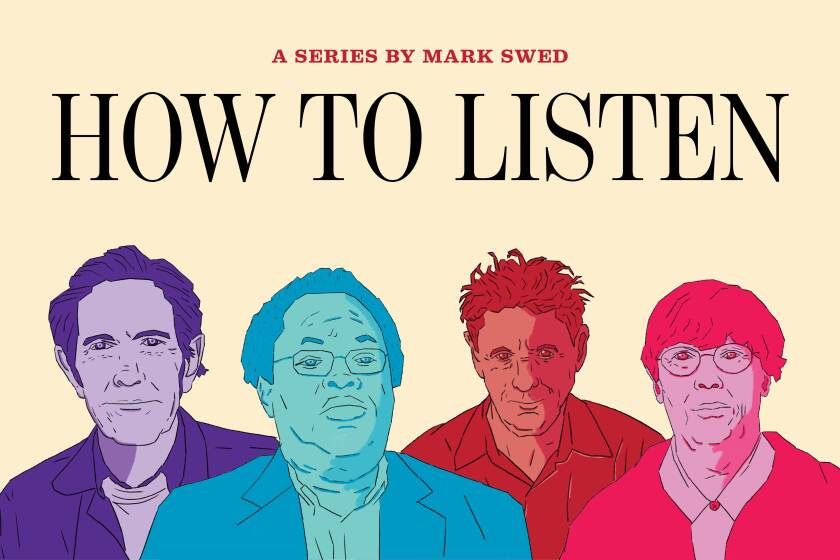Review: At L.A. and Long Beach operas, the pandemic gives young talent a spotlight
- Share via
The weekend wasn’t normal — new normal or any other kind of normal. It was, though, notable. Opera has proved especially problematic during the pandemic. So, the prospect Saturday night of witnessing Los Angeles Opera stage its first opera since the beginning of spring and Long Beach Opera mount a spectacular UnGala on Sunday brought hope that a corner might be getting turned.
The impediments of the pandemic have usefully and forcefully driven L.A. Opera and LBO to think about what the art form might look like for the next generation. Diversity is, of course, on every institution’s mind, a silver lining to this topsy-turvy moment in history.
That allowed L.A. Opera’s music director to indulge in one of his favorite passions: recovering neglected operas while also employing the resources of its training program for young artists, in association with the Colburn School. For this occasion, James Conlon picked Joseph Bologne’s “The Anonymous Lover,” as obscure a late 18th century opera as you might encounter. The production was filmed in Zipper Hall and will stream for free until Nov. 29 on the L.A. Opera website.
Bologne (or, possibly, Boulogne) also was known as Chevalier de Saint-Georges and, for a long time, patronizingly as Mozart Noir, the Black Mozart. Born in Guadeloupe, the son of a French plantation owner and an African woman that owner likely enslaved, Bologne became something of a celebrity in Paris. He was a handsome, famed swordsman, a virtuoso violinist, a dazzling composer and the leader of one of Europe’s most accomplished orchestras. He commissioned and premiered Haydn’s “Paris” Symphonies, and Conlon reasonably supposes that may have influenced Mozart, who was 11 years Bologne’s junior. One of Bologne’s biggest fans was Marie Antoinette.
Although many details of Bologne’s life are sketchy, history has hardly forgotten him — just ignored him, or at least his music. What part racism has played is difficult to evaluate. Race seems to have added to Bologne’s allure up to a point, that point being opera. He was to have become the head of Paris’ leading opera company — a position for which, by all accounts, he was supremely qualified — but he was turned down after certain star singers said they would not take orders from someone who was of mixed race. That leaves us with one of classical music’s great what-ifs. Of Bologne’s several operas, only “The Anonymous Lover” survives.
The main obstacle to any revival of Bologne’s opera, no matter its engaging score, is that Mozart, Haydn and Beethoven so dominated the Classical era that little else of the period poses much relevance to a modern audience. Even so, the composer clearly fascinates the young cast and the Juilliard-trained young director from Watts, Bruce A. Lemon Jr., staging his first opera — a comedy in which the secret lover of his newly widowed closest friend becomes something with which they have some respectful fun.
Coronavirus may have silenced our symphony halls, taking away the essential communal experience of the concert as we know it, but The Times invites you to join us on a different kind of shared journey: a new series on listening.
The production itself was a process of working around COVID-19 restrictions. Conlon recorded a chamber orchestra, masked, well-distanced and otherwise protected, in Colburn’s largest rehearsal room. The singers operated with two operatic hands tied behind their backs, hearing the orchestra only through small ear monitors and keeping their distance from one another. Yet they seemed thrilled doing so. All are winning, especially the leads, Tiffany Townsend and Robert Stahley.
French opera means dance, for which Bologne had a special talent, and a bit of sexy ballet does the show no harm. A feisty production team plays around with costumes and digital special effects in the filming. But in the end, Bologne’s chances for revival remain a better bet in the concert hall with his excellent violin concertos and string quartets. Indeed, the Bologne opera that holds the most intrigue would be one about the many-faceted composer himself.
LBO on Sunday evening displayed 20 potential young composers who might be capable of writing just that. For its UnGala, “2020 Songbook,” a ticketed fundraiser archived until Sunday, the company commissioned the emerging composers to write something short and operatic about life in this year. The composers were selected by five mentors — Anthony Davis, David Lang, George Lewis, Annie Gosfield and Du Yun. And, like these veterans, this projected future of opera represents different genders, races and ethnicities.
Each work, be it song, aria, brief scena or something outside categories, had a video to go along with it. The evening’s host was countertenor Anthony Roth Costanzo, broadcasting from his kitchen, and delightfully whipping up a chocolate soufflé as an intermission treat.
Perhaps the main takeaway from all of this is that the coronavirus has, if anything, magnified the company’s moxie. LBO has pledged to fully pay all its artists for work contracted this coming season (which will be overseen by Yuval Sharon and realized in whatever way the pandemic permits). What better pitch than a deluge of mercurial new talent eager to examine our current condition from myriad musical, visual, environmental, sensual, geographical, personal, physiological, ecological, philosophical, cultural and historical angles.
For many of them, this was a time to breathe deeply, to let silence penetrate, to meditate, but also to let it all out, whether in fervent song or an electroacoustic ether. This was just a taste, the equivalent of Costanzo taking a delighted spoonful of his soufflé. I would gladly hear what main course any of them comes up with next.
More to Read
The biggest entertainment stories
Get our big stories about Hollywood, film, television, music, arts, culture and more right in your inbox as soon as they publish.
You may occasionally receive promotional content from the Los Angeles Times.












